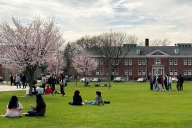You have /5 articles left.
Sign up for a free account or log in.
Budget cuts and fussy lawmakers have helped nudge more than a few public university presidents over to the relatively greener pastures of private colleges. But Mark Erickson is going the other direction: he’s leaving the presidency at a private liberal arts university to take the helm at a community college.
This summer Erickson will move from Wittenberg University, located in Springfield, Ohio, to Northampton Community College, which has a main campus in Bethlehem, Pa., and other locations in the Lehigh Valley.
Erickson’s career path is a rare one in higher education, but it's not a stretch. That’s because the two jobs, and even the two institutions, have plenty in common. And the similarities are growing.
Like Northampton, Wittenberg enrolls a large number of lower income students: fully 25 percent are first-generation college students and 25 percent receive Pell Grants. And as president of a college in an area hit hard by the recession, Erickson is deeply involved in local economic development and job creation, which are top priorities for most community college chiefs.
Fund-raising talent, however, hasn’t always been a must for aspiring presidents of two-year colleges. It is at Northampton, which listed “experience in and appreciation for the importance of fund-raising” in its presidential job ad. Presidents of four-year institutions spend more time on fund-raising than any other activity. Given shrinking public support for higher education, community college presidents may be heading that way as well.
Richard Ekman is president of the Council of Independent Colleges, a group of 700 small private institutions, including Wittenberg. He said can’t recall a president leaving a member college to take on a community-college presidency, but he mentions Kimberly Estep, who left the provost position at Tusculum College last summer to become provost at Nashville State Community College.
While Erickson's move may be somewhat novel, Ekman said Northampton should be a good fit. “It’s not such a big jump,” he said.
That's partially because Wittenberg and most of the council’s members are “refocusing their missions" to adjust to demographic shifts. “Look who’s going to colleges these days," Ekman said. "It’s disproportionately first generation and low-income students.”
The “completion agenda” is also helping spur small private colleges to enroll and graduate a more diverse range of students, Ekman said. As a result, private universities and community colleges share increasingly similar priorities.
Presidential Pipeline
Community college presidents generally have tough jobs. They make less than their peers at four-year institutions, and typically wrestle with tight budgets.
As is the case for college presidents across sectors, most two-year chiefs are nearing retirement age. Only 10 percent are under 50, according to the Pew Research Center. As a result, observers say community colleges may have to be more open-minded as they seek to replace retiring baby boomer presidents.
A handful of community college presidents hail from four-year institutions or outside of higher education, including a few from the business world, said Kay McClenney, director of the Center for Community College Student Engagement. For example, Thomas J. Snyder, president of Ivy Tech Community College, was formerly a corporate executive at an energy company and an automotive parts supplier. And although she had previously worked at community colleges, Regina S. Peruggi was president of Marymount Manhattan College, a private liberal arts college, and of a nonprofit group before becoming president of Kingsborough Community College.
Nontraditional two-year presidents will be more common in the future, she said via e-mail, as colleges deal with “increasing pressures to become more efficient and accountable, to develop new resource streams and to deal with the reality that university-based leadership programs are not producing new presidential candidates in the numbers the field will need.”
Erickson, who is 56, said one reason he’s making the leap is because he’s at the stage in his career where he wants to have the biggest impact on the challenges facing the academy. “The most interesting, important and innovative activity in higher education during the next decade will be occurring at community colleges,” he said.
While Erickson said Wittenberg does a great job with lower-income students, at “Northampton you can amplify that.”
Erickson is no stranger to the Lehigh Valley. He earned his doctorate in educational leadership from Lehigh University. Two of his professors from that program are the current and past presidents at Northampton. Arthur L. Scott taught one of Erickson’s classes, on current issues in higher education. Northampton’s president since 2003, Scott said Erickson should have a short learning curve in his new job, thanks to his familiarity with the college and its mission.
Scott also stressed the importance of fund-raising for his successor. Northampton got into private giving early, and has a $30 million endowment, which is large for a community college.
After receiving his doctorate, Erickson worked in several administrative roles at Lehigh, including dean of students and, most recently, vice president for administrative and government affairs, a job he held until departing for Wittenberg in 2005.
Bethlehem Steel Corporation, long a major employer in the region, had recently ceased local operations. The university wanted to help fill some of the void left by the company, and Erickson was tasked with creating “greater connectivity” between Lehigh and its hometown.
That experience also helped him at Wittenberg, where Erickson oversaw the creation of community service programs and economic partnerships with the city. He is particularly proud of the university’s new Center for Civic and Urban Engagement, which he helped launch in 2008.
Even so, he had to remind lawmakers that Wittenberg wasn’t an Ivory Tower. “Sometimes they think we’re only a privileged class of students,” said Erickson.
During his time at Lehigh, Erickson made plenty of connections with local politicians and business leaders that should help him in his new gig. He also has a good sense of the college’s personality, thanks in part to his wife. Lin Erickson is the former associate dean of community education at Northampton.
Like in any new job, Erickson knows the presidency at Northampton will come with a few surprises. Asked if he has any worries, he calls it a “little daunting” to follow two successful presidents, who also happened to be his former professors. But how did he do in his predecessor's class?
"He got an A," Scott said.








